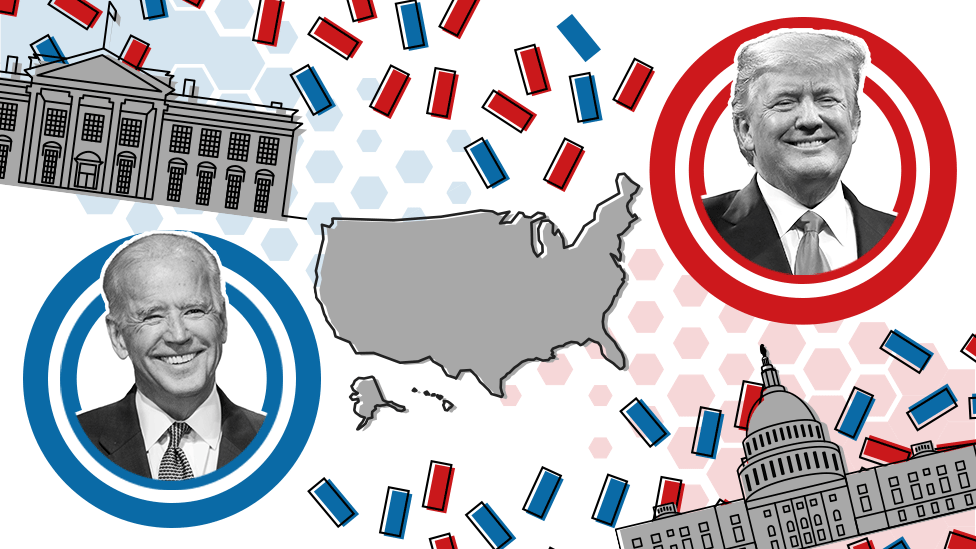US election: Biden says Florida seniors 'expendable' for Trump
- Published
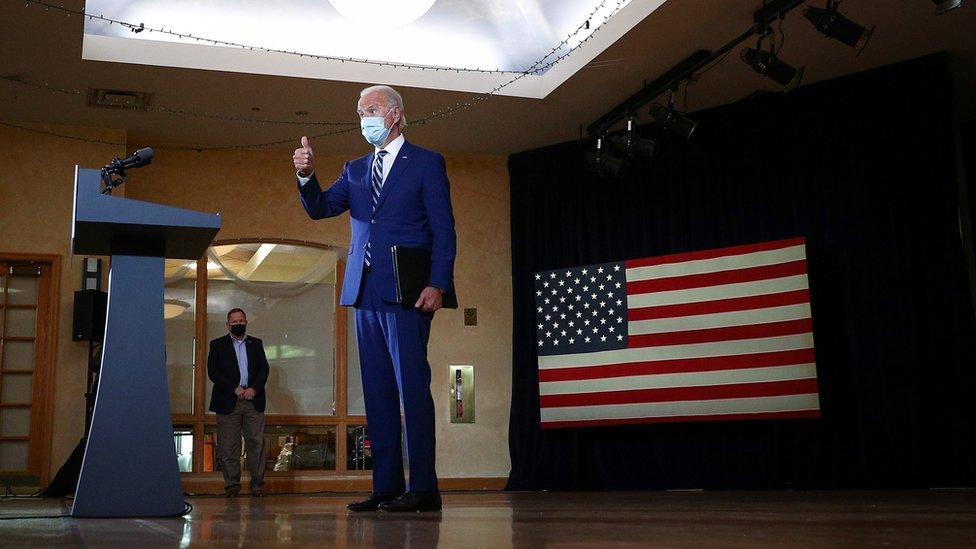
Joe Biden said the only senior Donald Trump seemed to care about was himself
US Democratic presidential candidate Joe Biden has criticised Donald Trump's handling of Covid-19, while courting elderly voters in the key battleground state of Florida.
He told them that the president saw seniors, who have been more at risk in the pandemic, as "expendable".
There are sharp policy differences between the two candidates on Covid-19.
In Pennsylvania, Mr Trump told thousands of supporters he felt like "Superman" after his Covid treatment.
The president tested positive for the virus on 1 October, spent three nights in hospital and was cleared by doctors to return to the campaign trail at the weekend.
He has a packed rally schedule this week, and on Tuesday in Pennsylvania made a pitch to women in suburbs - a key voting demographic.
"Suburban women, will you please like me?" he said. "I saved your damn neighbourhood."
The US women leading a "wine-fuelled rebellion" in the election
Battleground states like Florida and Pennsylvania are crucial for gathering the 270 electoral college votes needed to win the presidential election, which is not determined by a simple count of votes nationwide.
Opinion polls suggest Mr Biden has a 10-point advantage over Mr Trump nationally, but his lead in some key states is narrower. In Florida, the Democrat is 3.7 percentage points ahead, according to an average of polls collated by Real Clear Politics.
Mr Trump narrowly won Florida in 2016 in a result buoyed by senior voters. But the latest polls suggest a shift away from the Republican among them this time around.
After he pulled out of a presidential debate scheduled for this Thursday, Mr Trump now plans to hold a town hall event in Miami on Thursday night. The event will directly compete with Mr Biden's town hall in Philadelphia, which is scheduled for the same time and was announced last week.
What did Biden say in Florida?
The Democratic candidate spoke to a group of people at a community centre for seniors in southern Florida, with social distancing measures in place.
The event was in stark contrast to the president's mass rally on Monday in Florida.
Mr Biden accused the president of dismissing the threat that coronavirus posed to senior citizens.
"You're expendable, you're forgettable, you're virtually nobody. That's how he sees seniors. That's how he sees you," said Mr Biden.
The "only senior Donald Trump seems to care about" is himself, he added.
Mr Biden also criticised the president for holding "super-spreader parties with Republicans hugging each other without concern of the consequences", while senior citizens couldn't see their grandchildren. A recent White House event for the Supreme Court nominee led to several attendees testing positive for Covid.
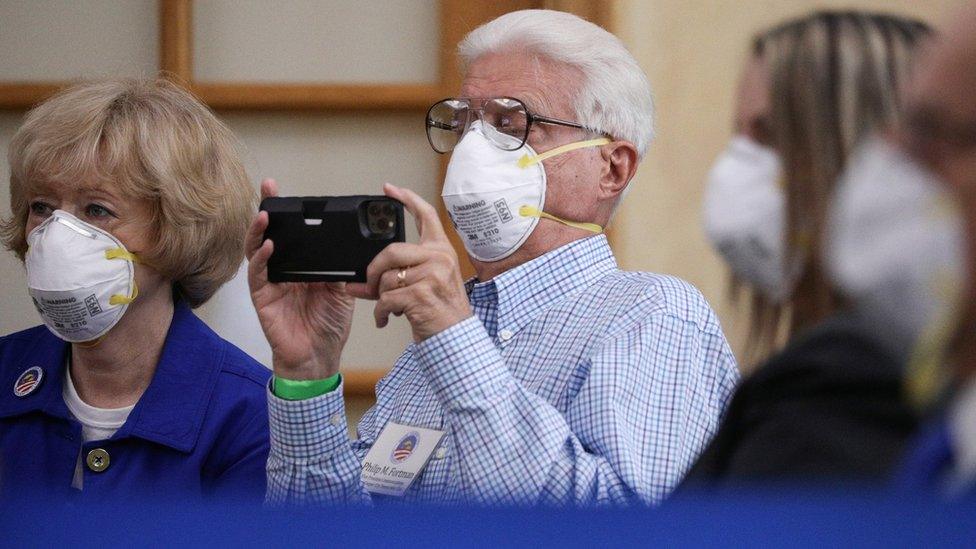
The Biden event had social-distancing measures, in contrast to the Trump rally
Introducing the Democratic candidate at the Florida event, congresswoman Debbie Wasserman Schultz said it was voters aged 65 or over who would "swing elections in the Sunshine State".
Joe Biden, 77, and Donald Trump, 74, are the two oldest candidates to contest a US presidential election.
But Mr Trump has regularly mocked Mr Biden as a senior citizen who lacks energy and is "sleepy". The president on Tuesday tweeted a doctored image of Mr Biden as a wheelchair-user and the words "Biden for Resident", implying a nursing home.
Opponents took to social media to say the tweet was disrespecting the elderly.
What did Trump say in Pennsylvania?
He appeared on an airport tarmac in Johnstown before a packed crowd. The supporters were divided on mask-wearing. Some chose to don a Maga (Make America Great Again) inscribed face-covering.
Mr Trump again railed against his Democratic challenger, saying Joe Biden was "not a nice guy".
"He's shot, folks. I hate to tell you, he's shot... can you imagine if you lose to a guy like this? It's unbelievable."
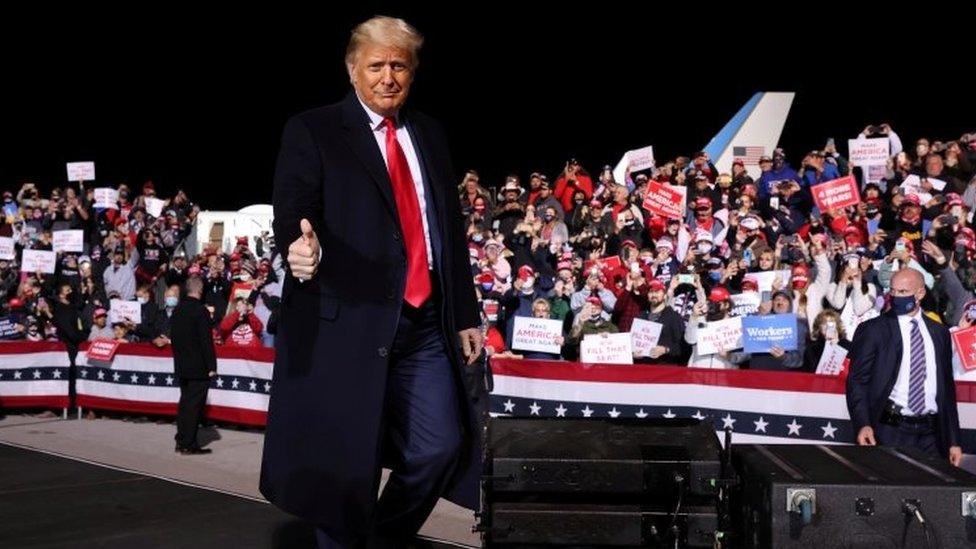
President Trump appears before supporters at an airport in Johnstown
Mr Biden's campaign has made much of his childhood in the state, but Mr Trump told the rally: "They say he was born in Scranton. But he left. He left. He abandoned you. Give me a break."
The president also attempted to woo the key voting demographic of suburban women, many of whom, opinion polls suggest, view Mr Trump unfavourably.
"So can I ask you to do me a favour?" the president said. "Suburban women, will you please like me? I saved your damn neighbourhood." Mr Trump has projected himself as a defender of suburban America amid a wave of street protests this year.

The President and Suburban Women, by Tara McKelvey, BBC White House correspondent
When the president was in Johnstown, Pennsylvania, in 2016, he spoke with confidence: "Women, women, women for Trump!" he shouted to an enthusiastic crowd. "Thank you, thank you."
He won the state, a key factor in his victory, partly because of the white female voters who supported him.
On Tuesday, though, he struck a different tone. "Will you please like me?" he said, addressing the women of Pennsylvania.
As the president knows, he is facing a tough campaign, and his support among female voters, especially those in the suburbs, is weak. A poll by the New York Times and Siena College showed that women in Pennsylvania support the Democratic nominee, former Vice-President Joe Biden Jr, over Trump by 26 points.
These women tell me that they are unhappy with the way the president has handled the pandemic, and they are concerned about his immigration policies and the treatment of children and families at the border, as well as with healthcare and other issues.
Among these female voters, at least, his latest appeal - "will you please like me?" - has fallen flat.
One is Amanda Cappelletti, a 33-year-old lawyer who lives in a Philadelphia suburb, who says the president has only made things worse for her community.
"What did he save my neighbourhood from? There was nothing wrong with it before," says Mrs Cappelletti, who is running as a Democrat for the state senate.
But Trump does still have his supporters. Retired suburban businesswoman Peggy Dellisanti, 66, says about Trump: "I absolutely love him. He talks like one of us."
"He's brash, he's not polished. But he gets the job done," says the resident of Bridgeport, a Philadelphia suburb.

Mr Trump said of his coronavirus treatment: "All I know is I took something, whatever the hell it was, I felt good very quickly... I felt like Superman."
The president has generally expressed scepticism about measures such as masks and lockdowns to combat the spread of Covid-19, which has killed more than 215,000 people in the US.
Mr Trump has other rallies planned this week in Iowa, North Carolina, Georgia and Florida again.
Why is Florida so important?
Despite trailing nationally, close races in crucial states like Florida mean Mr Trump may win re-election.
Under the electoral college system a candidate can win the most votes nationally but still lose, as happened to Hillary Clinton in 2016.
US election 2020: How to spot disinformation
Each state has a set number of electoral college votes based on its number of Congress representatives, so the hugely populous state of California has 55, while Hawaii has four. Florida has 29.
In all but two states, the winning candidate gets all the state's electoral college votes and needs 270 of the 538 to win the presidency.


This year's election has seen a number of issues that mark it as different.
Opinion polling suggests as many as nine out of 10 voters have already decided which way to vote, meaning there is limited leeway for the candidates to change minds.
The number of people who have already cast ballots in early voting is closing in on 10 million, an unprecedented number.
Postal voting will also be much higher, mainly due to Covid-19. Mr Trump has used this to regularly cite the possibility of election fraud, although the Election Commission says there is no basis for fearing that.



What questions do you have about the US election?
In just three weeks, Americans head to the polls to cast their vote for Donald Trump or Joe Biden. What questions do you have for American voters? Submit your questions here and we'll put them to our voter panel.
In some cases, your question will be published, displaying your name, age and location as you provide it, unless you state otherwise. Your contact details will never be published. Please ensure you have read our terms & conditions and privacy policy.
- Published6 November 2024
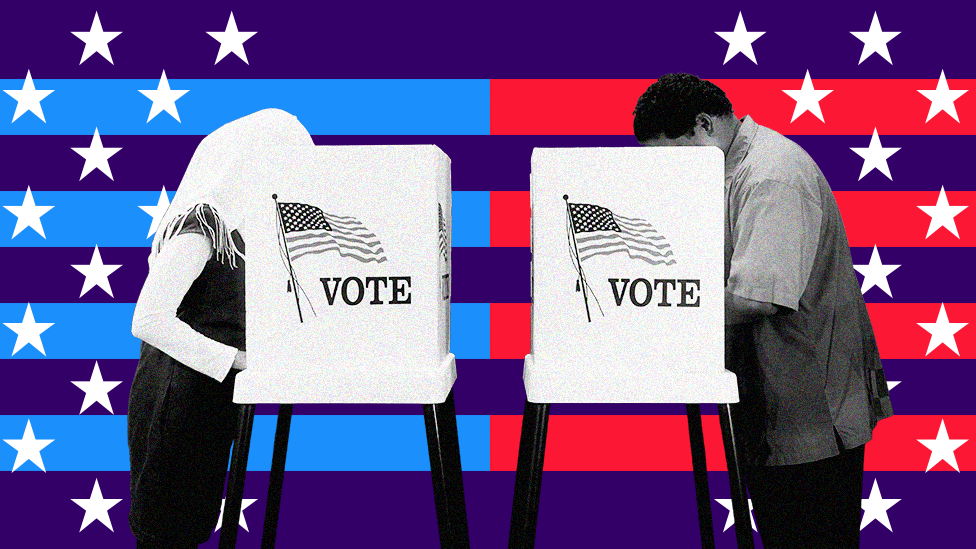
- Published2 October 2020

- Published28 October 2020
